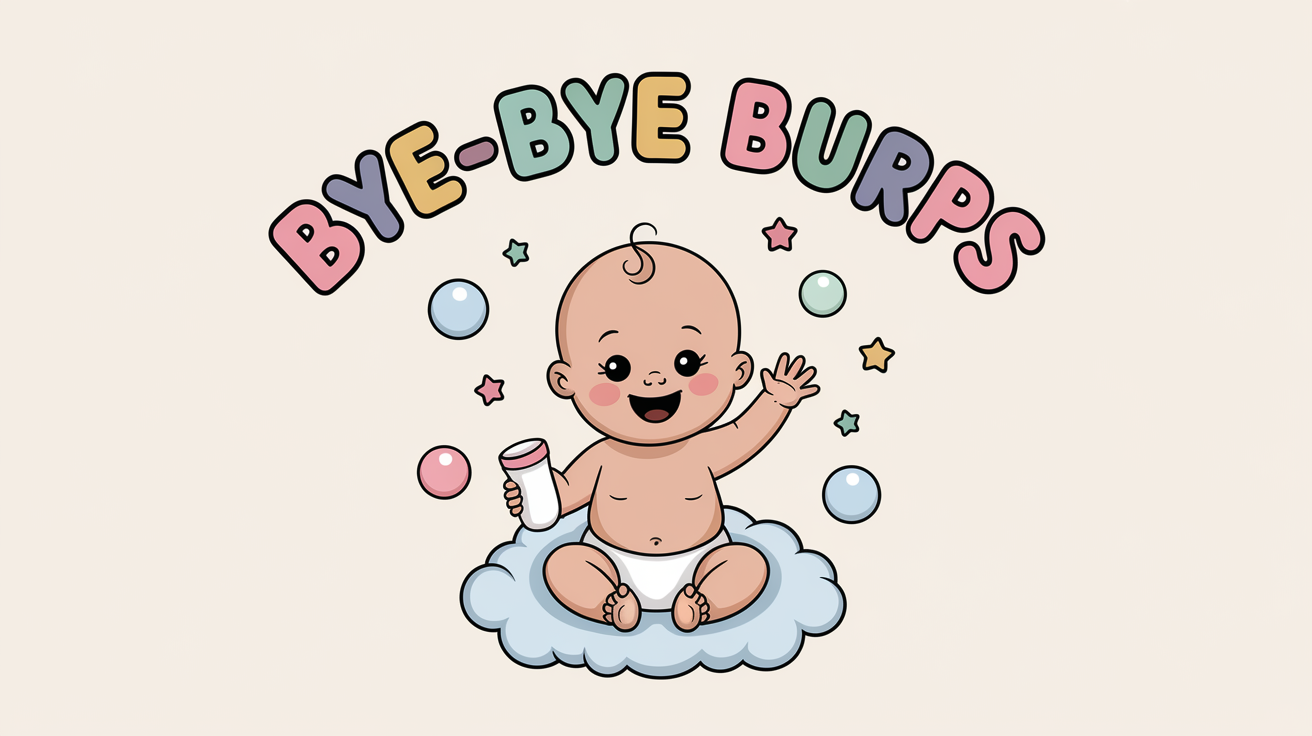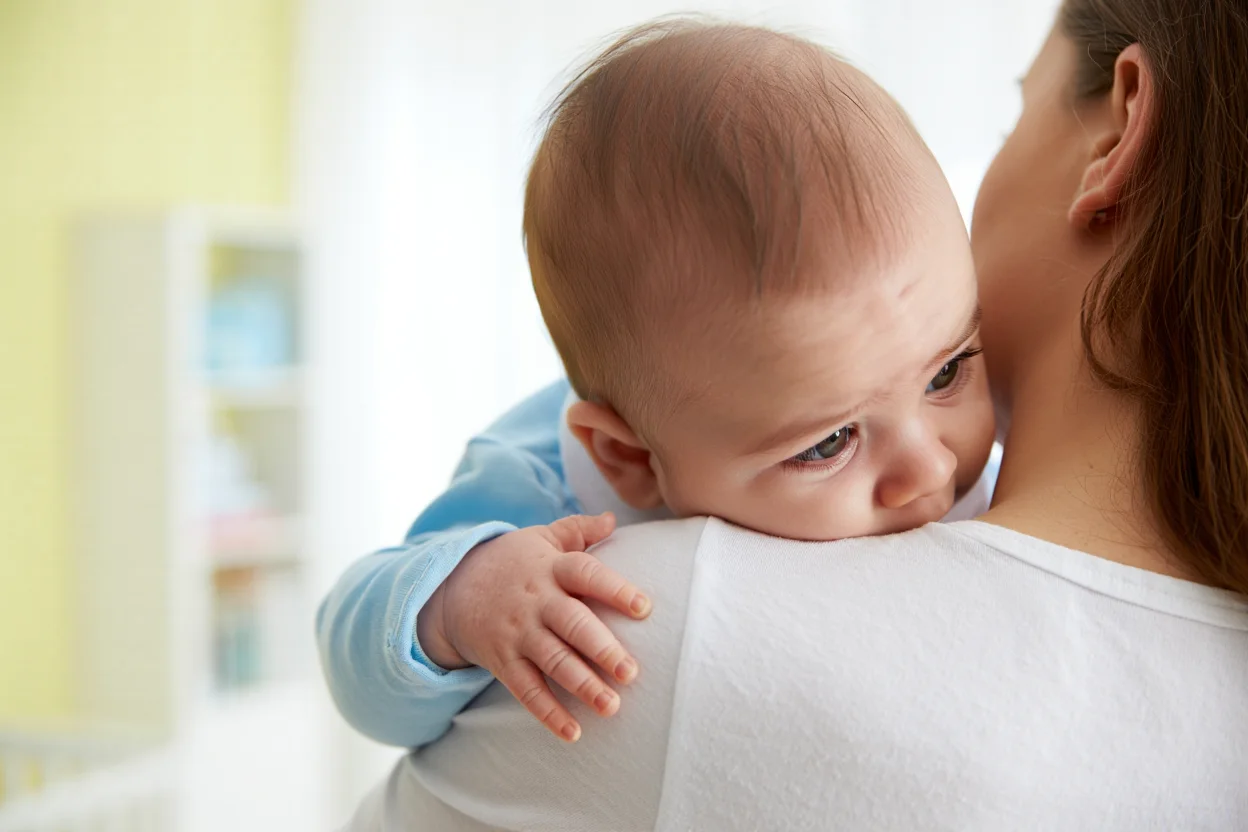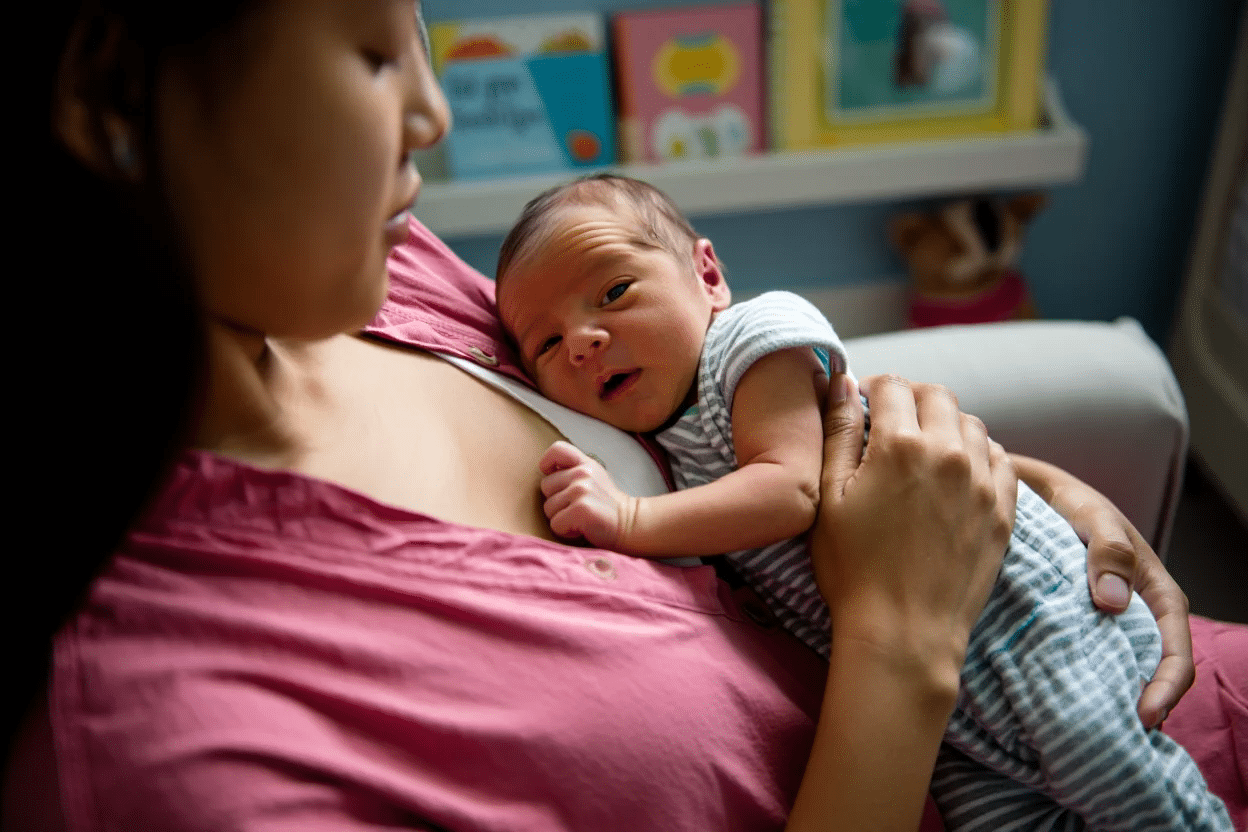
The tiny burp that brings big relief—it’s a sound new parents learn to celebrate. During infancy, burping helps release trapped air that babies swallow while feeding, preventing discomfort, fussiness, and spit-up episodes.
Did you know? Newborns swallow nearly 50% more air during feedings than older babies!
Many parents wonder at what age to stop burping a baby, especially as feeding habits and digestion improve naturally.
Most babies outgrow the need for regular burping between 4 and 9 months as their digestive systems mature and they develop better head and neck control. This transition typically coincides with when babies can sit unassisted and begin eating solid foods.
Watch for your baby’s cues. Decreased fussiness after feeding without burping might signal that your baby is ready to skip this step.
Why Do Babies Need to Be Burped?
Babies need to be burped because they frequently swallow air during feeding, whether breast or bottle-fed. Their immature digestive systems can’t easily release this trapped air on their own.
When babies aren’t burped properly, the trapped air can cause significant discomfort, leading to gas pain, excessive spit-up, and fussiness.
This discomfort often results in crying spells and disrupted feeding patterns. Proper burping techniques help release trapped air bubbles from the stomach, making babies more comfortable after feeding.
This simple practice supports healthy digestion and reduces common issues like reflux.
While most babies outgrow the need for burping around 4-6 months, when they can sit upright and have more developed digestive systems, it remains an essential part of newborn care.
When Do Babies Start Burping on Their Own?

Babies typically start burping on their own between 4 and 6 months of age, as their digestive systems mature and they develop better muscle control. This developmental milestone coincides with several other changes in your baby’s growth.
Key Developmental Signs
- Babies begin holding their heads up steadily and sitting with support around the same time they start self-burping.
- Their abdominal muscles strengthen, allowing them to manage better the air they swallow during feeding.
- As babies start eating solid foods (usually around 6 months), they naturally develop better control over swallowing air.
- You might notice your little one shifting positions during feedings or making small movements that help release trapped air.
- Each baby develops at their own pace, so don’t worry if your child takes a bit longer.
- By 8-9 months, most babies have mastered this skill completely, making those middle-of-the-night burping sessions a thing of the past.
When to Stop Burping a Baby

Most babies no longer need help burping between 6-9 months of age. By this time, they’ve typically developed stronger digestive systems and can naturally release air while sitting upright independently.
However, every baby develops at their own pace. Some infants might stop needing assistance as early as 4 months, while others may benefit from burping until they’re closer to a year old.
Watch for signs that your baby no longer needs help, such as decreased fussiness after feeding or naturally releasing gas on their own.
Your baby’s feeding method can also influence burping timing—bottle-fed babies often need to burp longer than breastfed infants.
The best approach is to follow your baby’s lead and gradually reduce burping sessions as they show less need for this assistance.
Signs Your Baby No Longer Needs to Be Burped
As babies grow, they naturally develop the ability to handle air during feedings. When your little one starts burping independently during or after feeds without your help, it’s a clear indication they’re mastering this skill.
You’ll notice significantly less spit-up after feedings, as their developing digestive system becomes more efficient at handling air bubbles.
This milestone typically occurs around 4-6 months of age, though it varies between babies.
Reduced fussiness or gas discomfort is another telltale sign. Your once gassy baby may appear more content after feeds without the burping ritual.
The most common sign is when your baby can hold their head upright consistently during and after feeding, showing improved muscle control and digestive maturity.
How to Gently Transition Away from Burping
| TRANSISTION TIPS | DETAILS |
|---|---|
| Use Upright Feeding Positions | Helps reduce air intake naturally. Keep baby at a 45° angle during feeds. |
| Hold Baby Upright After Feeding | Keep your baby upright for 15–20 minutes post-feeding to aid digestion. |
| Encourage Tummy Time | Helps release gas and builds core strength. |
| Use Gentle Back Pats | Pat in circular motions to help release trapped air bubbles. |
| Watch for Baby’s Cues | Look for signs like less spit-up or natural burping to reduce assistance. |
| Burp After Fast Feeds | Some babies may only need burping after rushed feedings. |
| Transition Gradually | Slowly reduce burping while observing for signs of discomfort. |
| Adapt to Baby’s Needs | Every baby is different—adjust based on their comfort and development. |
Helpful Tips for Easing Off Burping

Gentle burping techniques help babies release trapped air and reduce discomfort. Holding your baby upright during feedings naturally minimizes air intake, while pausing mid-feed often triggers spontaneous burps.
When burping assistance is needed, use gentle back pats or circular motions rather than forceful techniques.
This mimics the natural digestive rhythm and causes less distress. Monitor feeding amounts carefully, as overfull tummies increase gassiness and discomfort.
After feeding, maintain an upright position for 10-15 minutes to help air bubbles rise naturally.
Special tip: Try the “seated lean” position—sit the baby on your lap, supporting their jaw while leaning them slightly forward. This gentle pressure on the abdomen can encourage stubborn bubbles to release without distress.
Common Mistakes When Phasing Out Burping
When transitioning away from regular burping routines, parents often make several critical errors.
Perhaps the most common mistake is stopping too early. Many parents rush to eliminate burping sessions after just a few successful feedings without issues, only to experience regurgitation and discomfort returning.
This premature cessation can lead to more problems than it solves. Ignoring signs of discomfort is another serious error. Babies communicate through body language and cries when feeling gassy or uncomfortable.
Overlooking these signals can result in prolonged fussiness and disrupted sleep patterns.
Assuming all babies are the same represents a fundamental misunderstanding. Each infant has unique digestive development timelines and needs. What works for one baby’s transition may be completely inappropriate for another.
The most detrimental mistake is inconsistency in the phasing-out process, which can confuse babies and potentially extend the transition period unnecessarily.
Wrapping It Up
You can typically begin phasing out burping around 4-6 months as your baby’s digestive system matures.
However, every baby is unique! Watch for your little one’s cues—if they’re experiencing less gas, spitting up less frequently, or burping independently, it might be time to reduce this ritual gradually.
What’s your experience been like with burping your baby?
Have you noticed any changes as they’ve grown?
Try skipping a burping session after a calm feeding and observe how your baby responds. Note any patterns you notice quickly.
Remember: trust your parental instincts! You know your baby best. If you’re unsure about this transition, your pediatrician is always there to provide personalized guidance for your little one.
If you’re interested in more informational content on mothers and babies, feel free to click here and explore other blogs that you might enjoy.

